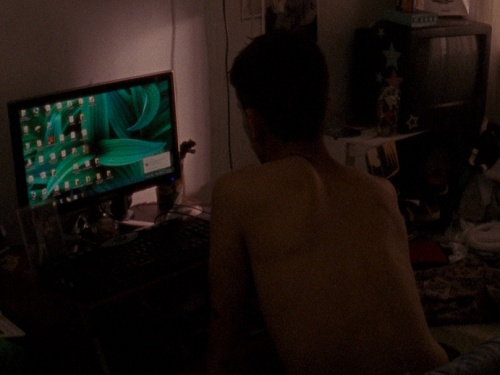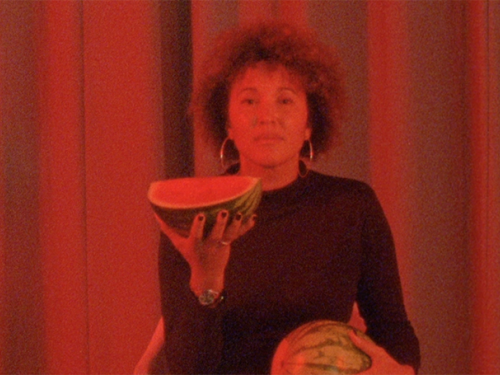Safar: One-Zero
Long before the ousting of Mubarak, football, like the call to prayer, is an activity that brings Cairo's teeming metropolis of nearly seven million to a standstill. Following the interwoven lives of eight characters, Kamla Abu Zekry's compelling ensemble film One-Zero (Wahed-Sefr), takes place on the eve of the Egypt v Cameroon match in the 2008 Africa World Cup Final. Subtly addressing conflicts of class, gender and religion, this realistic and gripping movie foreshadows the social and political complexities that unfolded in Tahrir Square last year.
Morning begins with a street urchin (Kamel Ashraf) stealing his grandfather’s stash of hashish and pop diva Nina (at the time the new Egyptian actress Zeina) getting her hair done by her former fiancée, an ambitious hairdresser Adel (Ahmed el Fishawy) in advance of an important television appearance. In another part of town, a wealthy divorcee and Coptic Christian, Naveen (Elham Shahin) announces to her Muslim nurse – later revealed as Nina’s sister Riham (Nelly Karim) – that at forty she has finally fallen pregnant after years of being given “fertility shots”. Director Zekry may start with recognizable stereotypes but slowly unpeels her characters’ addictions, ambitions and lives to reveal stark truths. Disillusioned, sneaking a drink or toking, TV presenter Sherif (Khaled Abol Naga) takes the fluff celebrity interview with Nina to new heart-wrenching heights in the TV studio, after a caller insinuates that her music career is akin to prostitution.
His is the character in the deepest crisis. Unlike the women who are grappling with issues of self-esteem and survival, Sherif, who seemingly has everything, is in fact an existentialist accident waiting to happen. By the afternoon, when everyone is reaching boiling point, Sherif has a sudden wake up call. He thought he was just a toy boy for Naveen who tells him her good news of the impending birth, soon followed by the announcement that she wants to wed. However once she is denied permission from the Coptic Church to remarry, she is left with the choices that confront thousands of Egyptian Copts, women and men alike, who belong to an ancient religious sect that doesn’t recognise divorce. She can either sue the church or convert to Islam.
Director Abu Zekry explained to NPR’s Peter Kenyon her motivation for including this controversial theme in the film: “I wanted to speak about this… because I have some friends who have this same problem.” (Perhaps a more interesting option would be to abandon the church altogether, although this is never once considered in the film, which provides an insight into religious affiliation as both identity and community in a country like Egypt.) Prior to the film’s release, a lawsuit was pending until the attorneys acknowledged that Coptic divorce was just one strand in the film among many others. Because of the threat of litigation, movies about Copts rarely receive official distribution and are usually only available underground via DVDs. One-Zero also broke other records by having women as director, scriptwriter, director of photography and editor.
In a city like Cairo with an established film industry, the politics of the filmmaking fraternity matters. There are members of the older generation, like actress Elham Shahin (Naveen in the film), who supported Mubarak and believe, according to the website Your Middle East, that the revolution wasn’t liberating because it brought the Islamists to power. To her disadvantage, she has been targeted by a Muslim televangelist over the love scenes from movies she appeared in from over twenty years ago.
However, the actor, activist and UNICEF goodwill ambassador Khaled Abol Naga sees the January 25th Revolution as a real opportunity. With the professor of diplomacy at Georgetown University and senior fellow at the Brookings Institute, Cynthia P. Schneider, Abol Naga wrote an editorial for CNN about the new Egyptian president. They feel that Mohammed Morsi is genuine about fulfilling the goals of the protesters. However, they also add “The jury is still out… He will be hard-pressed to meet the demands of economic and social justice that fueled the revolution.” Even director Abu Zekry was part of a group of ten directors – two of them women – who made short films telling the stories, real and imagined, of Tahrir Square that were brought together in 18 Days.
One-Zero’s pluckiness, like Egypt itself, is that high and low life exists cheek by jowl, and then there is the sheer determination of people who by rights should go under, yet they succeed against the odds. It is an aspirational film for a country wrestling with its future.
Malu Halasa is the Writer in Residence for Safar: A Journey though Popular Arab Cinema, a season of classic and contemporary Arab cinema at the ICA from 21 – 27 September 2012.
One-Zero screens tonight at 8.30 - stay for a post-screening Q&A with star of the film Khaled Abol Naga.
This article is posted in: Articles, Blog, Film
Tagged with: articles, Film, Film Festival, Guest blogger, Safar, writing





